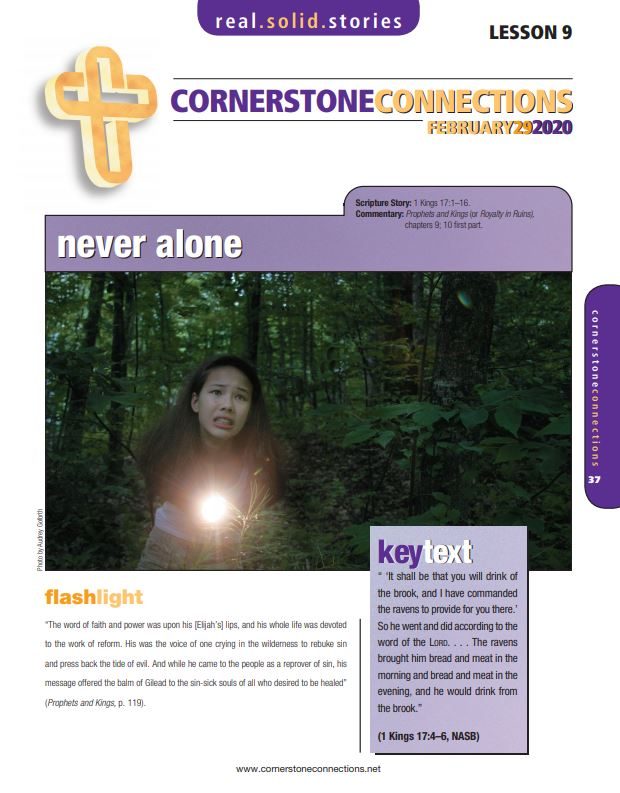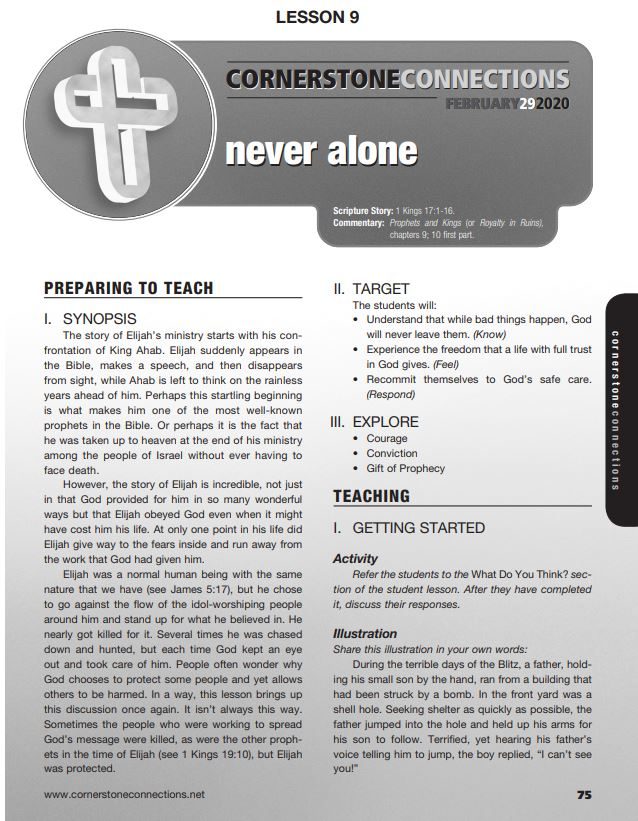Click below to download the Cornerstone Connections leader’s guide and student lesson. This week’s resources also include two lesson plans and a discussion starter video which offer different ways of looking at the topic. Each lesson plan includes opening activities, scripture passages, discussion questions, and real-life applications.
Scripture Story:
Commentary: Royalty and Ruin, chapter 9, 10 (first part)
Chapter 9

Chapter 10

Elijah, a normal human being, chose to go against the flow of the culture around him and stand up for what he believed in. His story reveals God’s presence and power because he spoke boldly on behalf of God. Elijah experienced obvious supernatural provision and protection (more than some other God-followers). We can feel challenged by Elijah’s example, and we can know God is with us just as he was with Elijah.
A servant of God never knows what they will be asked to do or what risks will be involved. God often asks His chosen ones to do things that don’t make sense. Take for instance when He asked Moses to get water from the rock, David to slay a giant with only a sling and a stone, or Esther to enter Xerxes’ court uninvited. In this week’s lesson, God again asks the unthinkable—not just once, but three times. Elijah, God’s faithful servant, is up for the task. But what about the other people in the story? Are they willing to fearlessly follow where God leads? Buckle up, because today’s lesson is a nail-biter.

Before you show your students the bags, ask for a volunteer to help you with today’s lesson. Explain that you are going to ask them to do something really brave. Hype this up until they feel a little nervous, then pick your volunteer.
Blindfold your volunteer.
Arrange the bags on a table and ask the volunteer to open a bag, reach into the bag, and describe what they feel inside. (This may take a little encouragement, but most will eventually reach into the bag.)
Have the same volunteer repeat with each of the three bags, or ask three people to each reach into the bag.
Very few people are willing to blindly follow instructions. Today’s Scripture lesson is about doing this very thing—blindly following instructions! Elijah and a widow are asked to trust God, even though they can’t foresee the outcome.

BIBLE STUDY GUIDE
Let’s read 1 Kings 17:1-7
Elijah Announces a Great Drought
1 Now Elijah the Tishbite, from Tishbe in Gilead, said to Ahab, “As the Lord, the God of Israel, lives, whom I serve, there will be neither dew nor rain in the next few years except at my word.”
Elijah Fed by Ravens
2 Then the word of the Lord came to Elijah: 3 “Leave here, turn eastward and hide in the Kerith Ravine, east of the Jordan. 4 You will drink from the brook, and I have directed the ravens to supply you with food there.”
5 So he did what the Lord had told him. He went to the Kerith Ravine, east of the Jordan, and stayed there. 6 The ravens brought him bread and meat in the morning and bread and meat in the evening, and he drank from the brook.
Elijah and the Widow at Zarephath
7 Some time later the brook dried up because there had been no rain in the land.
One youth pastor says:
“When I was younger, my family went on a backpacking trip in the mountains of Northern California. We had a blast fishing, swimming, and exploring. A challenge we experienced was that we hadn’t realized that the area water wasn’t safe to drink, and we had to boil every drop of water we consumed. Everything went fine until we started back to the truck. Somehow, the water container with our boiled water leaked all its contents and we didn’t have any water to drink for many hours. I was so thirsty. All I could think of was getting something to drink. When we arrived at the truck, we discovered that the only liquid we had was a warm soda. Four of us shared a few swallows of the warm, sweet soda, only to discover that instead of quenching our thirst, it made us thirstier.”
Now let’s read 1 Kings 17:8-16.
8 Then the word of the Lord came to him: 9 “Go at once to Zarephath in the region of Sidon and stay there. I have directed a widow there to supply you with food.” 10 So he went to Zarephath. When he came to the town gate, a widow was there gathering sticks. He called to her and asked, “Would you bring me a little water in a jar so I may have a drink?” 11 As she was going to get it, he called, “And bring me, please, a piece of bread.”
12 “As surely as the Lord your God lives,” she replied, “I don’t have any bread—only a handful of flour in a jar and a little olive oil in a jug. I am gathering a few sticks to take home and make a meal for myself and my son, that we may eat it—and die.”
13 Elijah said to her, “Don’t be afraid. Go home and do as you have said. But first make a small loaf of bread for me from what you have and bring it to me, and then make something for yourself and your son. 14 For this is what the Lord, the God of Israel, says: ‘The jar of flour will not be used up and the jug of oil will not run dry until the day the Lord sends rain on the land.’”
15 She went away and did as Elijah had told her. So there was food every day for Elijah and for the woman and her family. 16 For the jar of flour was not used up and the jug of oil did not run dry, in keeping with the word of the Lord spoken by Elijah.
This passage shows that God and Elijah had a special relationship. How God communicated with Elijah isn’t entirely clear, but Elijah trusted God and obeyed His instructions.
Now let’s examine this story from the window’s perspective.
Down to the last bite of food…
Out gathering sticks to build a fire and make that one, last loaf of bread…
Approached by a stranger asking for water and bread…
Deciding to go ahead and do what Elijah asks…
After seeing God keep His promise…
Following God isn’t always convenient or comfortable. God asked Elijah to put his personal comfort and safety at risk. God challenged the widow to put her complete trust in Him too. It seems that without much hesitation both Elijah and the widow did as God requested and were greatly blessed because of their faith.

APPLICATION
God asked the widow in today’s Bible story to share her last bit of food with Elijah. This week, look for ways you can also share your resources with others.

OVERVIEW
As a result of this lesson, we want the students to learn that the Lord knows what we need and He will always make provision for our needs according to His riches in glory. We can therefore, in faith and courage, fearlessly stand up for what we believe and trust in Him to make a way, even when we cannot see how He will provide.

Present the following scenarios to your students.
Imagine that you are shipwrecked on a deserted tropical island.
On your paper, list three things that you would like to have in your possession to make the experience manageable.
Beside each item, write why you chose it and whether or not it is necessary for survival.
If you could have one other person with you on the deserted island, who would it be?
Beside the name of the person you chose, write what they would do to make your life better.
Now consider this: If God were to choose for you, what changes to your list do you think He would make?
Imagine that you have been given one billion dollars to spend in one month to help people who are in need in your country.
On your paper, write what two specific needs you would spend the money on.
Beside each need you listed, write what it is about that need that makes it important and whether or not it is necessary for survival.
Write what will happen to people if those needs are not met.
Then write what you could do today, without any money, to help people with those needs.
Have you ever had to choose between obeying God and risking the loss of something you loved?
How did it make you feel? Why?
Did you believe that God would provide something better? Did He?
How does God provide for us even in ways we may not know we need yet?
God knows what we need even before we ask for it. When we spend time reading the Bible and praying, we will build faith that allows us to see how God provides for our needs. This week’s lesson includes two instances where God used extraordinary measures to provide for the needs of His people.
Imagine that you suddenly inherited a lot of money from a rich great-aunt who had no children. The only stipulation is that you cannot spend all the money at once. Instead, you will receive a monthly allowance to cover food, clothing, a luxurious home, and transportation (including frequent vacations with friends). How can you still view God as your provider when all of your material needs are being met in this way?
What else does God provide in addition to meeting physical needs?
Is it harder to trust God when you feel your needs aren’t being met?
Why are there still needy people around?
The widow gave to Elijah because she trusted God to provide. How willing would you be to share your last meal with someone else?

BIBLE STUDY GUIDE
Elijah was a man of faith. He followed God’s instructions and told King Ahab that a seven-year drought was beginning. This was a direct attack on the belief that Baal was responsible for providing rain and prosperity. People were in for a surprise as Elijah, braving possible persecution from the king, delivered this serious message. God kept him safe from the wrath of the king by hiding him and providing food delivered by ravens in the wilderness, even in the midst of the drought.
The story continues as God leads Elijah to another person of faith, even though she was not an Israelite—the widow of Zarephath. The story of her faith is so profound that Jesus mentions her in Luke 4:25-26 (NIV):
25 I assure you that there were many widows in Israel in Elijah’s time, when the sky was shut for three and a half years and there was a severe famine throughout the land. 26 Yet Elijah was not sent to any of them, but to a widow in Zarephath in the region of Sidon.
As she was gathering sticks to prepare her last supper before she and her son would starve to death, Elijah approached her and requested some water to drink. When she agreed, he also asked for bread.
She politely let him know that she only had enough flour and oil to make food for herself and her son. Elijah then put her faith to the test by requesting that she make a cake for him first, then make one for herself and her son. This would have seemed quite selfish and inconsiderate, but the prophet made her a promise in 1 Kings 17:14 (NIV):
14 For this is what the Lord, the God of Israel, says: ‘The jar of flour will not be used up and the jug of oil will not run dry until the day the Lord sends rain on the land.’”
She followed the word of the prophet, proved her faith, and God provided for her needs for the duration of the drought.
Who was Elijah?
Elijah gave up his freedom and comfort when he stood up for God. Do you think it was worth it?
Elijah could have complained after the brook dried up, but instead he just followed God’s leading to his next provision. How should we respond to God when we cannot see how He is going to provide for us next?
God caused a seven-year drought to prove that He was the provider of rain and food, not the idols. How can people idolize the following things, believing that they, on their own, can provide for their daily needs?
A stable job or successful business
Rich parents or family members
A lot of money in the bank
Why is it not smart to put our trust in these things?
Why do you think this widow was chosen?
How was the widow’s faith rewarded?
Let’s look at how Jesus asked us to trust in His provision in Matthew 6:31-33 (NIV).
31 So do not worry, saying, ‘What shall we eat?’ or ‘What shall we drink?’ or ‘What shall we wear?’ 32 For the pagans run after all these things, and your heavenly Father knows that you need them. 33 But seek first his kingdom and his righteousness, and all these things will be given to you as well.

APPLICATION
Ask your students to hold their breath to see which one can hold their breath for the longest time. Use a watch to track the time. After the last person releases their breath, make note of the time. It will usually not exceed 2 minutes.
Imagine if God would stop His provision of oxygen for just 5 minutes. A significant percentage of the world’s population would be dead by the end of that time. This should make it clear that we cannot survive without the constant provision of God.
This week, make a note each day, during your quiet time, of three things God has provided on a regular basis.
What can you do to provide for others this week, so they can feel God’s provision?
How should we respond if the way God provides is not to our liking?
Brainstorm with your class ways that you can be the hands and feet of God this week to provide for people around you who have needs.



